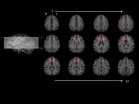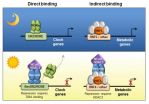Programming DNA to reverse antibiotic resistance in bacteria
Tel Aviv University researcher's novel strategy may sensitize bacteria to antibiotics to selectively kill antibiotic-resistant bacteria
2015-06-04
(Press-News.org) At its annual assembly in Geneva last week, the World Health Organization approved a radical and far-reaching plan to slow the rapid, extensive spread of antibiotic resistance around the world. The plan hopes to curb the rise caused by an unchecked use of antibiotics and lack of new antibiotics on the market.
New Tel Aviv University research published in PNAS introduces a promising new tool: a two-pronged system to combat this dangerous situation. It nukes antibiotic resistance in selected bacteria, and renders other bacteria more sensitive to antibiotics. The research, led by Prof. Udi Qimron of the Department of Clinical Microbiology and Immunology at TAU's Sackler Faculty of Medicine, is based on bacterial viruses called phages, which transfer "edited" DNA into resistant bacteria to kill off resistant strains and make others more sensitive to antibiotics.
According to the researchers, the system, if ultimately applied to pathogens on hospital surfaces or medical personnel's hands, could turn the tide on untreatable, often lethal bacterial infections. "Since there are only a few pathogens in hospitals that cause most of the antibiotic-resistance infections, we wish to specifically design appropriate sensitization treatments for each one of them," Prof. Qimron says. "We will have to choose suitable combinations of DNA-delivering phages that would deliver the DNA into pathogens, and the suitable combination of 'killing' phages that could select the re-sensitized pathogens."
Reprogramming the system
"Antibiotic-resistant pathogens constitute an increasing threat because antibiotics are designed to select resistant pathogens over sensitive ones," Prof. Qimron says. "The injected DNA does two things: It eliminates the genes that cause resistance to antibiotics, and it confers protection against lethal phages.
"We managed to devise a way to restore antibiotic sensitivity to drug-resistant bacteria, and also prevent the transfer of genes that create that resistance among bacteria," he continues.
Earlier research by Prof. Qimron revealed that bacteria could be sensitized to certain antibiotics -- and that specific chemical agents could "choose" those bacteria more susceptible to antibiotics. His strategy harnesses the CRISPR-Cas system -- a bacterial DNA-reprogramming system Prof. Qimron pioneered -- as a tool to expand on established principles.
According to the researchers, "selective pressure" exerted by antibiotics renders most bacteria resistant to them -- hence the epidemic of lethal resistant infections in hospitals. No counter-selection pressure for sensitization of antibiotics is currently available. Prof. Qimron's strategy actually combats this pressure -- selecting for the population of pathogens exhibiting antibiotic sensitivity.
"We believe that this strategy, in addition to disinfection, could significantly render infections once again treatable by antibiotics," said Prof. Qimron.
Prof. Qimron and his team are now poised to apply the CRISPR/phage system on pseudomonas aeruginosa -- one of the world's most prevalent antibiotic-resistant pathogens involved in hospital-acquired infections -- and to test whether bacterial sensitization works in a more complex microbial environment: the mouse cage.
INFORMATION:
American Friends of Tel Aviv University supports Israel's most influential, most comprehensive and most sought-after center of higher learning, Tel Aviv University (TAU). US News & World Report's Best Global Universities Rankings rate TAU as #148 in the world, and the Times Higher Education World University Rankings rank TAU Israel's top university. It is one of a handful of elite international universities rated as the best producers of successful startups, and TAU alumni rank #9 in the world for the amount of venture capital they attract.
A leader in the pan-disciplinary approach to education, TAU is internationally recognized for the scope and groundbreaking nature of its research and scholarship -- attracting world-class faculty and consistently producing cutting-edge work with profound implications for the future.
ELSE PRESS RELEASES FROM THIS DATE:
2015-06-04
La Jolla, Calif., June 4 -- In a scientific discovery that has significant implications for preventing HIV infections, researchers at Sanford-Burnham Medical Research Institute (Sanford-Burnham) have identified a protein that could improve the body's immune response to HIV vaccines and prevent transmission of the virus.
The study shows how a protein called polyglutamine-binding protein 1 (PQBP1) acts as a front-line sensor and is critical to initiating an immune response to HIV. When the PQBP1 encounters the virus, it starts a program that triggers an overall protective ...
2015-06-04
ANN ARBOR--African-American women are equally, if not more, likely to experience infertility than their white counterparts, but they often cope with this traumatic issue in silence and isolation, according to a new University of Michigan study.
African-American women also more often feel that infertility hinders their sense of self and gender identity.
The U-M study may be among the first known to focus exclusively on African-American women and infertility. Most research has been conducted on affluent white couples seeking advanced medical interventions.
"Infertile ...
2015-06-04
ATLANTA--The ability to delay gratification in chimpanzees is linked to how specific structures of the brain are connected and communicate with each other, according to researchers at Georgia State University and Kennesaw State University.
Their findings were published June 3 in the Proceedings of the Royal Society B: Biological Sciences.
This study provides the first evidence in primates, including humans, of an association between delay of gratification performance and white matter connectivity between the caudate and the dorsal prefrontal cortex in the right hemisphere, ...
2015-06-04
A tougher federal standard for ozone pollution, under consideration to improve public health, would ramp up the importance of scientific measurements and models, according to a new commentary published in the June 5 edition of Science by researchers at NOAA and its cooperative institute at the University of Colorado Boulder.
The commentary, led by Owen Cooper of the Cooperative Institute for Research in Environmental Sciences and NOAA's Earth System Research Laboratory, looks at how a new, stricter ozone standard would pose challenges for air quality managers at state ...
2015-06-04
Modern mountain climbers typically carry tanks of oxygen to help them reach the summit. It's the combination of physical exertion and lack of oxygen at high altitudes that creates one of the biggest challenges for mountaineers.
University of Washington researchers and collaborators have found that the same principle will apply to marine species under global warming. The warmer water temperatures will speed up the animals' metabolic need for oxygen, as also happens during exercise, but the warmer water will hold less of the oxygen needed to fuel their bodies, similar to ...
2015-06-04
If you want to live, you need to breathe and muster enough energy to move, find nourishment and reproduce. This basic tenet is just as valid for us human beings as it is for the animals inhabiting our oceans. Unfortunately, most marine animals will find it harder to satisfy these criteria, which are vital to their survival, in the future. That was the key message of a new study recently published in the journal Science, in which American and German biologists defined the first universal principle on the combined effects of ocean warming and oxygen loss on the productivity ...
2015-06-04
From a single drop of blood, researchers can now simultaneously test for more than 1,000 different strains of viruses that currently or have previously infected a person. Using a new method known as VirScan, researchers from Brigham and Women's Hospital (BWH) and Harvard Medical School tested for evidence of past viral infections, detecting on average 10 viral species per person. The new work sheds light on the interplay between a person's immunity and the human virome -- the vast array of viruses that can infect humans - with implications both for the clinic and for the ...
2015-06-04
PHILADELPHIA - Around-the-clock rhythms guide nearly all physiological processes in animals and plants. Each cell in the body contains special proteins that act on one another in interlocking feedback loops to generate near-24 hour oscillations called circadian rhythms. These dictate behaviors controlled by the brain, such as sleeping and eating, as well as metabolic, hormonal, and other rhythms that are intrinsic to the organs of the body. For example, when you eat may have affects on rhythms controlling fat or sugar metabolism, illustrating how circadian and metabolic ...
2015-06-04
This news release is available in Japanese.
An analysis using updated global surface temperature data disputes the existence of a 21st century global warming slowdown described in studies including the latest Intergovernmental Panel on Climate Change (IPCC) assessment. The new analysis suggests no discernable decrease in the rate of warming between the second half of the 20th century, a period marked by manmade warming, and the first fifteen years of the 21st century, a period dubbed a global warming "hiatus." Numerous studies have been done to explain the possible ...
2015-06-04
This news release is available in Japanese.
Many species are migrating toward Earth's poles in response to climate change, and their habitats are shrinking in the process, researchers say. Two new reports focusing on marine organisms, which have been moving pole-ward at higher rates than terrestrial creatures, show how factors, including those not directly related to climate change, are limiting the ranges of corals and fish. Paul Muir and colleagues investigated 104 species of reef corals -- collectively known as the staghorn corals -- and confirmed the hypothesis ...
LAST 30 PRESS RELEASES:
[Press-News.org] Programming DNA to reverse antibiotic resistance in bacteria
Tel Aviv University researcher's novel strategy may sensitize bacteria to antibiotics to selectively kill antibiotic-resistant bacteria



